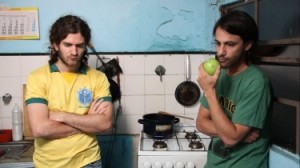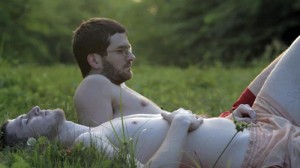By Mark James.
Argentinean director Marco Berger first gained notoriety for his 2009 Berlin Film Festival hit, Plan B—a film that explored modern gay romance in an ironically authentic Buenos Aires where nothing is as it appears on its surface. In the film Berger fuses genuine erotic suspense with romantic comedy clichés, all subverted into the story of Bruno, whose plan to win back his girlfriend backfires when he becomes seriously attracted to her boyfriend.
Berger (like other Latin American queer filmmakers of late) offers a sophisticated counterpoint to anglophile narratives that have become sexually muted and predicable. In his films — from Hawaii (2013) where a handsome writer house-sitting in the country wants to seduce a drifter handyman — to Butterfly, a love story told in parallel and based on the ‘butterfly effect’ of chaos theory — Berger’s characters often try to solve the duality in their hearts by retreating into themselves and into fantasy. His is a queer cinema of subtlety and emergence, a moody paranormal panorama of yearning and heartbreak, with characters who daydream about the pursuit of desire wherever it might be found, and in whichever gender. They upset conventions and yet are fully inserted into contemporary culture, influenced by their ancestry but forging new ways of living and loving.
With this internal struggle—and often class distinctions—on display, Berger very much belongs to his region, and a cinema that has emerged in a period of reinvigorated life and artistic expression, where progressive politicians have supplanted the old powers, however briefly.
When I met Marco Berger, it was made very clear how brief a progressive moment in the sun can be—it was pouring rain, an afternoon just before the Presidential run-off, the Right was making a comeback and there was a palatable sense of resignation inside the Café de Patriotas, which serves in Berger’s western Buenos Aires neighborhood as a gathering space for Peronist progressives. After Berger apologized for being late (he was busy running his drama school), I began by asking him about the influence the Argentine political situation has on his work. Although he often references politics on social media, his films might seem less political.
“My films are gay-themed, which in itself is political — films about men in love are a political act. The politics of my personal life are very important,” Berger says of his work, adding “right now I really like the government and I don’t want it to change. The alternative is a shift to the right – I don’t come from a rich family, I am state school-educated, and I feel like I could grow a lot with this current government and if we change that’s going to become more difficult.”
Berger’s family life is fairly typical of Argentina’s modern middle class. (His father works at the Norwegian embassy), and as such he represents a common concern with the current political situation. Berger’s coming out was fairly typical as well. “My mother was really supportive from the beginning.” Berger says of the experience. “I mean, she was disappointed in that typical ‘Oh, I’m not going to become a grandmother’ way. My father said I had to go to psychoanalysis, therapy to try and change. So I did it and of course nothing happened. You cannot change.”
This relatively contemporary coming out story is often reflected in Berger’s protagonists, who generally don’t suffer from anguish around their burgeoning sexuality as so many do in more conventional films. In his follow-up to Plan B, 2011’s Absent took as its topic the sexual power a teen possesses over an adult male love interest — with the boy in control.
However, these characters are not autobiographical per se. Rather, they emerge primarily from Berger’s fantasy life — “If a guy rings my bell with a pizza and I pay him and he leaves, in the back of my mind I think about him staying, how we could be friends and we could fall in love…”
Parts of this scenario making of course come from Cinema itself — Berger admits that his films have a bit of a ‘this would only happen in film’ quality — “I am always thinking about how people fall in love,” he says. This combination of personal fantasy and classic cinema have been forged into Berger’s distinctive style — both tensely sexual but also sensual and romantic, with the camera often lingering on the parts of gay imagination and sensuality that all gay boys grow up trying to process — the sight of a man’s arms, hands, legs, hair… handsome faces and the male body.
Berger explains these cinematic choices in reference to what he sees as the great gay directors. “Some gay directors today focus on the obvious, like muscle or party boys or on women like Almodóvar. No one films the male body the way Jarman did or Fassbinder did, like it’s art: faces, butts, dicks or just the beard shot very carefully. If I see a man in a cafe and I look at his arm and maybe it’s very blonde and very hairy. I could spend a half an hour looking at his arm or even smelling him.”
If this is imagery we see often, Berger works it at a wholly different level, avoiding images of what he calls ‘the stereotypical gay way.” When I asked what exactly was meant by that he elaborated: “Like some guy in swimming pool wearing a Speedo. A celebration of masculinity.” As is clear from this very specific idea of imagery, Berger makes films for no one if not himself. Discussing how his style grew, “I think I have discovered I have to be the perfect spectator for my films. I was once in the DVD store and there weren’t any gay films I wanted to see so I said ‘let’s make one!’ So I make my films for me and then I realized that a lot of people think like me.”
This confidence and independence is a running theme of our conversation. The history of Berger’s creative process as he told to it me was a history of this young man doing his own thing—against the ‘best of luck’ glances and corrective advice from others. When discussing his family, he recounts him telling his father (when criticized for only making films on gay topics)—”I don’t care. I’m going to make what I want.”
When discussing the making of his film Hawaii, he told me how this independence manifests itself in his filmmaking: “At the end of making Hawaii there was this idea it would be ‘better for the festivals’ if I didn’t resolve the relationship. But for me, I don’t care about that. People need to see how it resolves. So they kiss and yeah it’s romantic. I let others talk about doing controversial projects that they think will end up at Cannes. Whereas I think my work is always talking about love. Love between men. And I’m going to keep doing it until I die.”
This clear passion for making movies generally — and in his own vision specifically — can also be seen in his intense work ethic and in current projects. There is Fulboy a documentary about the world of soccer that Berger says “plays with the homoerotic aspects of the sport.” And another that Berger describes as “a triangle between three straight guys — there is an encounter and the youngest feels he was taken advantage of and seeks revenge.”
And as mentioned at the late start, Berger also runs a dramatic arts school where he prepares actors for the screen with his own method, using his experiences from directing to get better performances. To explain this, Berger told me an anecdote: “Once I told someone just to stare at the floor and count backwards from nine — and it looked great on screen.”
As for after these projects, Marco Berger does not know, explaining that everything depends on the funding — and his odds of getting that could all change with the new government. But whatever happens, you can be sure Berger will be making films for a long time — “I always said I am not going to stop until I’m rich so I keep shooting and trying to grow.”
Mark James lives in San Francisco and is a frequent contributor to Film International.




